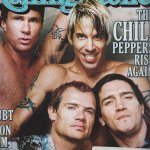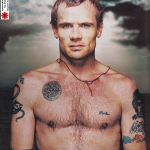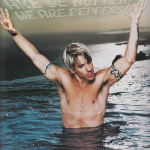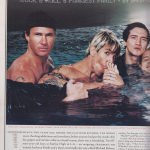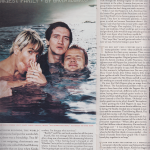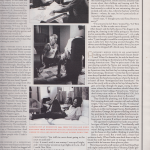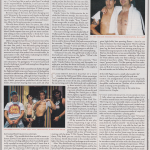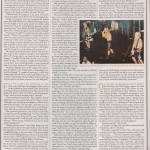Note: The magazine was slightly larger than the scanner so I’m sorry that some of the edges are missing on the photos; two scans have been merged on the text pages to capture it all with an extra scan for the middle of pages 3-4.
We now have the Spanish version of this: Rolling Stone May 2000
TWENTY-TWO YEARS AGO, before the platinum records, the world tours, the drug addictions and overdoses, before anyone had put the words chili, hot, peppers and red into order as a band’s name, there was a friend ship.
Two 15-year-old boys at Fairfax High in LA – an outgoing, charismatic one named Anthony Kiedis and a short, terminally shy one called Michael Balzary but better known to you and me as Flea – became so inseparable that on days when Kiedis didn’t show up, Flea would just walk the school grounds by himself. “I’d circle around,” he says. “I didn’t want anyone to see that I was all alone.” One of the first things Kiedis told Flea – while they were getting stoned on a bus taking them to Mammoth Mountain for a ski trip – was that he was a survivor. Kiedis said, “If a planecrashes, I’m the guy who survives.” “Really?” said Flea and took another hit off the joint. In part, this was teenage hubris, but at 37, after a long run of extremely life-threatening behaviour, Kiedis says, “That feeling hasn’t changed at all. Whether I’m in jail or in a rehab or just half-dead somewhere, I always have an innate sensation that says, ‘You’re going to get out of this mess,’ That can be a good thing or a load thing; it gives you carte blanche to explore areas you have no business going into.” The Red Hot Chili Peppers have survived across 17 years and seven albums, enduring personnel turnovers and crises that would have ended three lesser bands. Their latest record, Californication, is not only a triple-platinum hit, it’s their finest sustained work ever.
What does it mean to be a Chili Pepper in the year 2000? It means that you still play party funk with more bounce to the ounce than any other rock band but have dramatically expanded your sonic palette. It means that, improbably, you have matured from a half-naked, out-of-control Young Turk into a half-naked elder statesman. It means that you can walk through life holding tragedy in one hand and merriment in the other. It means that you are in a group whose members frequently declare their love for each other but don’t hang out much anymore. When I visit the Peppers in LA, frontman Kiedis, bassist Flea, guitarist John Frusciante and drummer Chad Smith try to choose a group activity I can attend. They have no rehearsals planned; a Lakers game is ruled out because Frusciante doesn’t like sports. I ask what they’d do on tour with a night off. They all laugh. Flea explains, “I’d stay in my room and meditate, Chad would go out to strip clubs and get drunk, John would do yoga and play guitar, and I don’t even know what Anthony would do.” Have you all learned to stay out of each other’s hair? “No,” says Flea, “we still get in each other’s hair. But now we say, ‘Sorry for being in your hair.’”
The Red Hot Chili Peppers have had so many guitarists- seven – they could hold a reunion barbecue for them every summer. Their current lineup, however, is the only one that has recorded more than one album together. Original guitarist Hillel Slovak died of a heroin overdose in 1988. Frusciante, then an 18-year-old Peppers fan, joined the band for 1989′s Mother’s Milk and 1991′s breakthrough, BIoodSugarSexMagik. He quit abruptly in 1992; Arik Marshall filled in for that summers Lollapalooza tour (he now plays in Macy Gray’s band). Jesse Tobias lasted a little longer than a gallon of milk. Dave Navarro of Jane’s Addiction signed on for 1996′s One Hot Minute and left in 1998; now he’s working on a record with his new hand, Spread. On tour, the Chili Peppers play no songs from One Hot Minute. The fundamental problem with it appears to have been that while the Peppers like to improvise. Navarro had a different style of composition, laying down multiple guitar tracks in the studio and then melding them. Frusciante says he’s never listened to One Hot Minute. ” Nobody’s ever made a good case to me why I should,” he explains. After quitting the Chili Peppers in 1992, Frusciante descended into severe heroin addiction, nearly dying. He finally checked into a hospital in January 1998 for treatment. The following March, Flea invited him to play with the Peppers again. Kiedis remembers their first rehearsal with Frusciante as the standout moment of the whole Californication experience: “When John gets excited, he’s like 8 billion volts of electricity. He was knocking things over – it was absolutely chaotic, like a little kid trying to set up a Christmas tree. And when he hit that first chord, it was so perfect – this blend of sounds from these people who I hadn’t heard play together in so long.”
I join the band for dinner at a Moroccan restaurant where the waiters wear fezzes and the meal concludes with a belly dancer. Kiedis has begged off sick, explaining that his head has swollen up to the size of a football; the other three openly scoff at this excuse. “I came here once with my mom,” Flea says. “I stuffed myself and drank seven glasses of wine. And back then, I was playing basketball every night. I was so fanatic, I wasn’t going to not play just because I was drunk and stuffed. So I threw up all over the court.” FRUSCIANTE: You told me once about going to the court on acid and – FLEA: It wasn’t acid, it was ecstasy. I was up all night, and I went to play as soon as it got light, at 6A.M. And I could. Not. Miss. Are you the best player in the band? SMITH: [Straightening his six-foot-three frame]I’m better than him. But Flea’s very quick. I think we could take on any other band two-on-two. Who could beat us? Long silence as they ponder this conundrum Master P. FLEA:[Nodding] Master P would fuck us up. How’s Anthony’s game? FLEA: He shouldered me in the face really good once when we played basketball. SMITH: He’s a wildman. He’ll defend you like a fucking wet rag. He’s all over you, like [emits primal animal scream, accompanied by flaying arms]. Frusciante excuses himself early; he’s working on his third solo record, and he’s finding it hard to carry on a conversation when all he can think about is the mastering process. Smith and Flea amiably trade stories about their children and touring with Nirvana in South America. Flea describes a dream he had in which he was swimming, then got on land and took a bus, where he had sex with Foxy Brown; whom he says he isn’t particularly attracted to when awake. Smith says, “I thought you said Foxy Brown is nasty?” “I’m attracted to Lil’ Kim,” insists Flea. “Lil’ Kim is the one I’d like to take out to dinner.” After dessert and the belly dancer, Flea lingers in the parking lot, chatting in the chilly spring air. He shows me his automobile, dubbed “the clown car” – it’s a 1989 Mercedes with every panel elegantly painted a different colour. “I just thought it would be a cool piece of art,” Flea says. Lately he’s been having second thoughts. his 11-year-old daughter, Clara, used to love it, but now she asks to be dropped off a block away from school.
Anthony Kiedis lives in an apartment building not far from Hollywood’s Sunset Boulevard. When I’m buzzed in, he and the band’s tour manager are working out the itinerary of the Peppers’ upcoming American tour. They’ve spent most of the last year playing outside the States, just recently returning from Japan and Australia. This summer they’ll play major American cities, but first they’re visiting smaller ones like Chattanooga, Tennessee – towns they haven’t played since they all packed into a blue Chevy van. Kiedis wants to make sure the band stays in places where the local colour hasn’t all been “homogenised into Styrofoam.” He sits on his couch with an atlas in his lap, licking his fingers as he flips through the pages, trying to determine where the band members should sleep IF they play in State College, Pennsylvania. “One hundred ninety-nine miles to Philadelphia? OK, let’s stay In Pittsbutgh, then jam down to Roanoke.” They finish the planning and Kiedis stands up. He’s shorts and a sweater with red and black stripes. “You want a beverage?” he asks. “A soda pop? A glass with ice?” The answer to all three questons is yes, so as the road manager leaves, Kiedis glides to the kitchen. Onstage, he’s prone to flailing around; in his apartment his motion is subdued and economical, as if he has spent four decades learning to get from point A to point B without wasted movement. The apartment is pleasant but lacks any particular signs of Kiedis’ personality. “I accidentally sold my old house,” he explains. “A few years ago, I wasn’t feeling myself and wanted a clean slate.” He put his house on the market, thinking it would take about a year to sell. But a week later, a buyer had written a cheque. When Kiedis came back from a trip, he found his stuff had been put in storage, where it has stayed while he bounces from place to place.
Hovering around is a tall woman with short blond hair and a tight candy-pink shirt; this is Yohanna, Kiedis’ girlfriend of 18 months. While we talk, she makes phone calls in the bedroom. He glows as he speaks about her and how they met: She was a hostess at the trendy New York eatery Balthazar; and he was smitten the moment he saw her. The first year the relationship was long-distance, but now she lives with him. Kiedis, Smith and Flea are all 37 years old; their birthdays are within two weeks of one another. Smith and Flea have had children, though; does Kiedis think of settling down and starting a family?
He swallows. “Well, yes and no. I’m so in love with kids, it’s always in the back of my mind. But it scares me – I’ve lived my life as such a solo flyer. I’m afraid of the responsibility: Suddenly, I can’t just run off. With a partner, I feel like I’m signed up, but you know, there’s always a mysterious back door. If I had to jump out of this plane, “I’m pretty good parachuter.” Between legs of the tour, he’s been hanging out with Yohanna by the ocean in such locales as Bali and Hawaii. “I’m a fairly pathetic surfer” he says, laughing. He loves the water; although he runs and mountain-hikes, his favourite exercise is swimming. We talk about Kiedis’ hair.’ For years, one of the band’s trademarks was him whipping around his long dark mane. Since 1998, however, it’s been short and blond. Kiedis reports that now girls are more comfortable talking to him and less likely to think he’s “some kind of a weirdass hippie that they’d rather live their lives without ever knowing.” Did he change his hair because of some event in his life? Kiedis mulls the question. “I didn’t think that at the time. But, yeah, I was definitely going through a change. I had decided to be clean. It was a whole new era for myself and my band.” When Kiedis finishes a sentence on a topic that makes him uncomfortable, he punctuates it with a half-smile, indicating his relief at having completed the thought. “I’m such an idiot when it comes to analysing my own situations,” he apologises. “I’ve never had much time for looking at myself and seeing how things have developed or why” Kiedis and Slovak both nursed heroin habits through the ’80s. Kiedis was even thrown out of the the band for a month in 1986 because of his addiction. When Slovak died, Kiedis cleaned up, although he has frequently relapsed. Most recently, after a motorcycle accident in 1997, Kiedis’ prescription painkillers led him back to heroin. He says he’s staying clean now, and I ask what he’s learned from his previous attempts. He sighs. “You would think there would be some coherent answer. I have spent so many of my years under the influence of drug addiction that it’s probably genetically encoded in every cell of my body. I know that it stopped adding anything positive to my experience years ago. So, you know, I don’t take any of my clean time for granted. It’s all been wonderful.” Talking about himself, Kiedis often lapses into platitudes. So he recounts his battles with heroin in a way that seems to hide all struggle, pain and darkness. Some might regard this as deceptive – Kiedis trying to put the best face on his own life. But it seems much more the case that he’s describing the person he wants to be. And year by year, he comes closer to actually being that man.
Kiedis’ lyrics for Californication do include his funk-sex stomps, but more than ever, he’s writing stories of loneliness and remorse, like the single “Scar Tissue”. Three songs refer to marriage. Kiedis says he doesn’t know the specific number but is aware that his commitment to Yohanna has been emerging in various lyrics. The sun is setting over the cloudy hills of Hollywood; the room grows dark, and Kiedis’ face becomes dim in the shadows. I ask him what the most rock-star thing about him is, and he draws a blank. His bank account is large, he concedes. “I bought my family houses, I drive expensive cars,” he says. “I never see bills or worry about money. I’m probably the wrong person to ask this. He trails off, with no half-smile, still contemplating. “Yohanna!” he calls. His girlfriend strolls in from the bedroom and turns on the lights. “What’s the most rock-star thing about me?” She thinks for a moment, then answers, “Your teeth.” Kiedis flashes his molars and bicuspids In a wide grin, and they do shine brilliantly. I excuse myself to use the bathroom; when I return, the couple is in a standing embrace, kissing gently.
Chad Smith’s House is halfway up a steep slope in the Hollywood Hills, where sometimes random deer will stare down oncoming traffic. Smith gives me a tour of his airy, comfortable home: The swimming pool in the back yard with a child-safety fence around it, the collection of photographs. We end up in the living room, which has a drum kit and a blazing fire. Smith gets us Heinekens, lights a cigarette and unfolds his lanky body on the couch. He’s wearing a New York Yankees cap backward, although his team is the Detroit Tigers. He grew up in Michigan, where he was fired by multiple employers, including a paint company (screwed up a big order), a Gap (never mastered the sweater fold) and a pancake house (spilled a vat of maple syrup). All he wanted to do was play drums, beginning at age seven, when he pounded on Baskin-Robbins ice-cream tubs. After “barely graduating” from high school, he played with a slew of bands, most starting with the letter T: Tilt, Tyrant, Terence. One of them, Toby Redd, put out a record; when they opened for Kansas, Smith discovered, to his wonder and delight, that there was free food backstage at rock concerts. After Toby Redd broke up, Smith headed out to LA; in 1989 he auditioned for the Chili Peppers, and he has been cheerfully sitting in the drummer’s seat ever since, the band’s steadiest member. “I’m not tortured,” he says. “I wasn’t a drug addict, and I didn’t lose my shit.” As the drummer, Smith has had the easiest time of it when the Peppers go onstage in outlandish costumes – giant light bulbs, hats spouting flames – since he can keep his balance by remaining seated. There’s nothing quite so extreme on their current tour: On the European leg, the band started out wearing matching embroidered orange jumpsuits in the style of Afropop star Fela but ditched them as too uncomfortable. The Chili Peppers’ most famous costume – nothing at all except for white athletic socks over their schlongs – has been retired, at least for a while. “We’ve done it so many times,” groans Smith. “it’s like putting the Kiss makeup back on. Give us $100 million for the reunion tour of 2022 we’ll do it in every town. You won’t be able to see the sock under our fat bellies, but it’ll be on”.
If the Chili Peppers were a smell, what would it be?
SMITH: A 12-year-old girl’s bicycle seat. KIEDIS: An amalgamation of our own strong body odours. Flea and I, we can generate some absolutely skunklike confrontation. Neither of us is afraid to smell as strong as we possibly can. FLEA: A dog – funky but cosy at the same time. FRUSCIANTE: Purple.
I Visit John in the hills, about 20 minutes from Smith’s place. It’s a modest rented house: two rooms plus a sleeping loft. The living room is essentially empty, except for a TV set, posters of Andy Warhol movies and, tucked away in a corner, an original of Marcel Duchamp’s “Museum in a Box”.
Frusciante spends most of his time in the other room – crammed with enormous stacks of vinyl records and music equipment – playing guitar. He used to own a larger house, he says: “It burned down, and then it was rebuilt, and then I moved into it, but I stopped paying for it. And eventually it was taken away from me. I almost saved it – my lawyer got me the money to get it back. But it was sold the day I got the money. That was fine with me, because that was 50,000 extra bucks I could spend on heroin?” His management wants him to buy another house now; for tax reasons, but he likes these two small rooms: He has evetything he needs, and it’s easier to control the temperature. Frusciante’s slacks hang low around his waist, and he wanders around his home with the distracted air of a scientist mulling an unfinished experiment. When he talks, it’s in a slurred drawl, often with pauses and backtracks, like he’s not used to sharing what’s inside his head – at least not as sentences. He spends hour after hour in his music room, just playing guitar. That’s where his thoughts flow pure and free. While recording Californication, he’d play all day with the band, then come home and continue playing, by himself. Asked how being a Pepper is different this time from last time, Frusciante recalls how touring as an 18-year old let him indulge every adolescent fantasy. “I was to totally abusing the situation,” he says. “But by the age of 20, I started doing it right and looking at it as artistic expression instead of a way of partying and screwing a bunch of girls. To balance it out, I had to be extra-humble, extra-anti-rock star.” He became so dogmatic in this that he could no longer see any way to participate in the band and still be an artist. He quit. Unfortunately, his progress as an artist went backward, as he spent most of his time consuming heroin. Today, Frusciante’s arms are covered with abscess scars; they look like they’ve suffered third-degree burns. He was taught to shoot up by people who didn’t really know how; when he started getting abscesses, he persisted anyway: “I just didn’t care what was going to happen to me. I always thought I was very close to dying.” Frusciante thought he would never be able to kick heroin. “When I was a junkie, I would think, ‘How at can I ever stay clean? I’ll always be able to compare it with how it feels to be on drugs.’ And I thought being on drugs was the ultimate way you could feel. I was so proud to be on them. I love everything that I felt on drugs, but I can do more justice to those feelings by trying to re-create them with my music.” He says his scarred arms don’t bother him and that he’s recently felt confident enough to start taking his shirt off onstage again, an essential part of being a Pepper. “I wouldn’t trade them for the way I used to look,” he says. “At 19, I might have looked like a stud, but I was a weakling inside. I wasn’t proud of who I was then. And now I’m proud of who I am.” Frusciante debuted most of the songs for his upcoming solo album in his living room, in impromptu concerts for friends: “A couple of years ago, I could only make people feel sad. That was the only ability I had. So it means everything to me to be able to sit down and sing and play guitar and make whoever I’m with feel good.”
Flea pulls into his driveway in the clown car; with him is his daughter, Clara, whom he has picked up from school. She’s fresh-faced, with long red hair and bell-bottoms. She runs into the house and spots a stack of DVDs in the living room. “Can I watch a movie tonight, Papa?” she asks. “Don’t you have homework?” Flea counters. A brief negotiation ensues; apparently, all of Clara’s school work right now is for long-term projects. “Work on the speech for an hour,” Flea tells her, “and then you can watch a movie.” He has a friendly joint-custody agreement with his ex-wife, who lives just down the road. Flea’s sprawling home has a lot of dark-wood walls; he enjoys the hunting-lodge look. “I’ve been living in nice places for sometime now,”, he says. “And I never take it for granted. I walk around and grab the walk and say, ‘This is mine. I don’t have to worry about anyone taking this.”
“Wanna see my room?” says Clara, sharp and self possessed. She leads me through a hallway covered with photographs of Flea’s heroes, including Miles Davis and Billie Holiday, to her own room. It’s large and white and has a door leading directly to the pool outside. She’s decorating it with magazine pictures of Blink182, Christina Aguilera and Limp Bizkit’s Fred Durst. Next she shows me Papa’s room, demonstrating the feature she truly envies: a remote-control fire place. “He’s the spoiled kid,” she says affectionately. Back in the kitchen, Flea is making us dinner:turkey sandwiches and some steamed asparagus and broccoli. He’s wearing a rust-orange sweater, black vinyl pants and loud blue-and-yellow Adidas. He loves to cook, although he freely admits that his enthusiasm outstrips his skills. “Can I have this, Papa?” Clara asks, holding a box of chicken-flavoured rice. Flea casts a critical eye over the ingredients – there are a lot of artificial flavours – but agrees and gets some more water boiling. Flea was born in Australia; his family moved to the US when he was four. He recently got American citizenship, although he expects to eventually retire Down Under. Asked whether he considers himself American or Australian, he says, “Neither. I’m Hollywoodian.” Flea started off playing trumpet,’ he didn’t pick up a bass until around age 8. “I liked Dizzy Gillespie. I didn’t know anything about rock music. Once I had a notebook and I wrote ‘Styx’ and ‘David Bowie’ on the cover, but I had no idea who they were. But before I ever played, I visualised myself making the bass as exciting as any guitar player, jumping around going crazy.” Flea’s lickety-split finger-popping has won him numerous awards and accolades; lately though, his style has matured, becoming more melodic. As we talk, three cats (Peppy, Angel and Froggy) and two dogs (a walrus like one named Martian and a smaller one named Laker) wander around the kitchen. Clara tells me she named them all; Flea objects, saying he named Laker. “No, you wanted to call him Ankles,” she says. Dinner is served. The rice has come out soupy; Flea says that’s how it’s supposed to be, but Clara persuades him to strain it. At the table, Clara starts eating while reading an Archie comic. Flea bows his head to pray. “You don’t have to wait for me to finish praying,” he says. “Nobody else does.” After we eat, Flea shows me the bungalow where he’s working on his solo album; then we retire to the TV room. There’s an enormous projection set, used almost exclusively for Lakers games. We talk about Californication. The making of the album was not a happy time for Flea. He was breaking up with his girlfriend of five years and taking it hard: not sleeping crying a lot, wanting just to curl up in the foetal position. Every day he’d focus his energy on getting it together enough to show up at the studio, knowing he’d find solace in the music. Which he did but every 20 minutes or so, he’d have a panic attack and find himself covered in sweat. The one consolation for Flea after these bleak months is that he knows he’s confronted his sorrow. The last time he went through this, when he split up , with Clara’s mother, in 1990, he handled it differently. “I just got high and got laid and forgot about it”, he says. And this time, I didn’t go be with other girls – I dealt with it. I dealt with the most cold, empty feeling I could ever imagine. I walked through the pain. After one recent show in Italy, Flea stood on the side of the stage sobbing, his body wracked with grief. On occasion he’s found his daughter taking care of him. “In Australia, I was crying one day”, he says, “and she said, ‘Look, Papa, I don’t know why you’re so sad, but no matter what, it’s going to be OK. You’re such a good person’. It was an amazingly touching thing”. Now that he’s feeling better, Flea is trying to abandon all his superstitions. He used to have a host of them: taking six steps when walking out of the kitchen, never wearing black underwear, not leaving a book on the bed because the ideas might leak out of the pages and into his psyche. “I was trying to do all these little things to prevent myself from being hurt,” he says. “It’s basically losing trust in the universe. Now I’m not afraid of anything. Every day now I pray: ‘Bring it on.’” In a band where sensitivity has steadily triumphed over had behaviour, Flea is the prince of being in touch with his emotions. “There’s all this angry, screaming metal now,” he says. “It’s part of a thing that we started, in a lot of ways. This funky sound with rapping and guitars has been turned into something very boring: right wing, redneck bulishit. It was always funny to me,the way the Chili Peppers were perceived as this macho-jock thing. We took off our shirts a lot, and Anthony wrote a lot of songs about sex. But I feel like the music is frequently feminine. I’ve always been, like, the girly-boy. I’m just a sensitive little fuck, you know?” The Day Of John Frusciante’s Thirtieth birthday, the Chili Peppers gather for band business and a photo shoot. Flea shows up wearing a shirt on which he has written “Martian + Laker with a magic marker. “I thought I was going to write something really profound,” he says with a shrug. “But I just ended up with my dogs’s names. Kiedis arrives and gives Frusciante a hug. During breaks, the band huddles around a TV, watching the Lakers dispatch the Miami Heat. Flea kneels on the carpet, about a foot from the screen, completely focused, “Normally, at the game, I don’t even want anyone talking to me,” he says. The band and a couple of staffers surprise Frusciante with a chocolate cake and a vigorous “Happy Birthday”, Kiedis’ baritone booming. Frusciante turns red and puts his hands over his mouth. In three tries, he blows out the candles, to much applause. Speech, speech!” calls Smith. Frusciante considers this and takes a step backward. “Ummmn, nah”, he declines. “I’ll make a speech for him!” Flea volunteers and switches into a deep, nineteenth-century-orator voice. “On this day….”, the room dissolves into laughter. The affection for Frusciante, the band’s some-times-wayward little brother, is palpable. “Coming into early teenagerhood,” Flea says, “Anthony and me and some close friends, we really raised each other.” The Red Hot Chili Peppers were brought together by friendship, pulled apart by heroin, reunited by music. They all still live a 10-minute drive away from one another; after 17 years as a band they find themselves an improbable but inseparable family.

